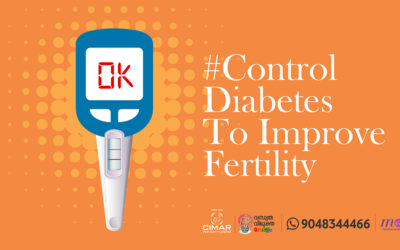It is no secret that diabetes is a serious health concern that demands attention and consistent care. Most diabetics manage to control the disease with healthy lifestyle and regular medication, which helps them to reduce the impact relatively. However, most people are blindsided to the effects diabetes has on their fertility. Many couples fail to realise the issue until faced with difficulty in conceiving.
Diabetes doesn’t directly cause infertility but it has negative impacts on male and female organs that makes pregnancy a goal that is difficult to accomplish. While women face with issues related to reproductive system worsened by diabetes, men suffer from some conditions that are induced by it.
PCOS and Diabetes
The impacts PCOS has on fertility is complex. It interferes with ovulation cycle and cause oligomenorrhea (irregular periods) or secondary amenorrhea (absent periods). Both these conditions can reduce the chances at pregnancy significantly. Many couples are aware of the consequences of PCOS and seek help when faced with difficulty in conceiving.
However, what most people are blindsided to is the correlation between diabetes and PCOS. Surveys show that PCOS women are more prone to diabetes than others and vice versa. Consequences of PCOS such as obesity and being underweight also play a role here.
Ticking Biological Clock
Most women reach menopause (when menstrual cycles has come to an end and no longer gets periods). After this point, a woman cannot naturally conceive as the ovaries no longer produce eggs. A diabetic woman is prone to premature menopause, also known as premature ovarian failure. In such cases, ovaries stop producing eggs and the woman hit menopause before she turns 40.
Many researchers have studied the correlation between early menopause and diabetes. While studies by Elas S Sytromeyer shows that type 1 diabetes often follows with greater possibility of menstrual abnormalities including premature ovarian failure, research by Clara C. Elbers suggests that women with type 2 diabetes are also at greater risk of premature menopause.
Growing Risk of Cancer
Endometrial cancer, also known as uterine cancer is one of the issues that go undetected until it’s too late. Even if the patient is able to survive cancer, the possibility of conceiving is rare afterwards. Women who suffered from other reproductive cancers such as cervical cancer and breast cancer are also prone to infertility even after surviving it. It is the treatment for cancer including chemotherapy that affects the chance of conceiving than cancer itself.
The chances of developing endometrial cancer is more common among women with type 2 diabetes and PCOS due to chronic anovulation. Contemporary researchers are coming up with more connections between chronic anovulation and reproductive cancers.
Gestational Diabetes and Spontaneous Abortion
Diabetic women are likely to go through an alarmed pregnancy. Even if you do not have diabetes, the possibility of developing it after conceiving, called gestational pregnancy is not out of question. A diabetic women’s body is not getting enough glucose due to low levels of insulin and this could significantly affect the growth of the foetus. Babies born to diabetic women are at higher risk of abnormalities such as heart defects and neural tube defects. The risk of preterm delivery is also on the radar. Not controlling diabetes before and during pregnancy could result in spontaneous abortion as well due to insufficient energy supply.
Diabetic Men and Infertility
Diabetic men are likely to experience problems such as erectile dysfunction, retarded ejaculation and retrograde ejaculation. While erectile dysfunction and retarded ejaculation involve difficulty with getting or maintaining an erection and delayed ejaculation, retrograde ejaculation occurs if nerves are unable to control the muscles of the bladder from closing at the point of ejaculation, which results in semen entering the bladder rather than exiting via the penis. At most times, these problems are caused by nerve damages due to low blood circulation and insufficient glucose supply. Men with such issues may find it hard to conceive naturally, but can easily get pregnant via IVF.
Degenerating Sperm Quality
Diabetes is one of those autoimmune diseases that can affect your reproductive system in several ways. In case of men, it is the quality of sperm which is a vital factor in the process of conceiving. Several researches show that men with type 2 diabetes have low testosterone levels (hypogonadism). While it has no known effects on motility of sperm, the sperm count is significantly affected. Hypogonadism may lead to reduced sex drive also which can influences the chances of conceiving naturally. One of the secondary impacts of diabetes that can determine the chances of pregnancy is obesity as it can lead to reduced sperm concentration.
Even though most couples with issues related to diabetes can be helped with consistent care and medical attention, early detection of the problem and controlling the sugar levels before conception itself is the safest bets.
About the Author
Dr. Parasuram Gopinath is the Senior Consultant & Scientific Director at CIMAR Fertility Center with branches in several parts of Kerala. Tamil Nadu & Dubai. After Dr Parasuram completed his post-graduation in Obstetrics and Gynecology, his work has been mainly focused on infertility and embryology. He had undergone further training in Advanced Reproductive Techniques like Oocyte Cryopreservation, IMSI, IVM etc. from several centers in Singapore, Germany & Canada. He has personally done over 3000 ICSI procedures and was instrumental in introducing the technique of IMSI in South India. He is an Invited speaker at Several National conferences on Infertility and do also have several publications to his credit.

Dr. Parasuram Gopinath, MBBS. MS(OBG)

